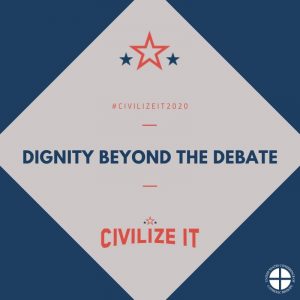Pope Francis has long recognized the ruptures along ideological lines that are occurring, threatening the unity of the society as well as the church.
Throughout his papacy, the pope’s talks during weekly general audiences at the Vatican, and his teaching documents have invited people to reach out to others even when it is difficult to do so.
Miguel Diaz, a professor in the Department of Theology at Loyola University Chicago and former U.S. ambassador to the Holy See, said Pope Francis hopes that people “encounter” each other. He suggested that people heed the pope’s call and open their minds and hearts as a step toward recognizing the dignity of others.
“Civility requires a certain degree of humility. When that’s missing, it’s difficult to engage with a conversation with another human being,” Diaz said.
“To practice civility, the first thing is we must have in mind some rules of engagement. Those rules require us to listen to and listen for things. It requires good listening skills,” he continued.
“Beyond the listening, it requires an attentiveness to the word and what words do. In the best of cases, words should be used to create and construct and not to constantly put down another human being. Words are given precisely to create a bridge rather than to separate us from one another,” Diaz said.
The Catholic community itself has been afflicted with shouting diatribes among its members as well. The call to recognize each other as sisters and brothers as Sister Teresa Ann described has been ignored at times even by Catholics holding differing views of what they believe the church should be emphasizing to bring people closer to God.
This is an illustration for “Civilize It: Dignity Beyond the Debate,” an initiative launched by the U.S. Conference of Catholic Bishops to promote civility and respectful dialogue during this presidential election year. (CNS illustration/courtesy U.S. Conference of Catholic Bishops)
The Diocese of Camden, New Jersey, is among those working to address such differences. During the current election cycle it has implemented the “Civilize It” program being promoted by the U.S. Conference of Catholic Bishops for the 2020 election.
Matt Davis, diocesan director of Life and Justice Ministries, told CNS that his office has utilized the program at listening sessions and discussions that explore the importance of respect for others, as called for in church teaching.
Developed in 2016 in the Archdiocese Cincinnati to help parishioners understand the importance of civility as a virtue, the “Civilize It” campaign has been adopted with a few tweaks by the U.S. Conference of Catholic Bishops for the 2020 election. The program stresses that respectful dialogue — rather than name-calling and nasty barbs — can occur among people with differing political views.
One such session in the diocese was held two hours before the first presidential debate. Davis said people left to watch the debate thinking they “must be role models ourselves, to be witnesses” to civility. “And when you’re attacked to rise above it,” he said.
Miller at the University of Dayton said such efforts can help people understand that society must preserve the norms that have united the nation since its founding.
“And we can use the means at our disposal to serve the common good as best we can.”


